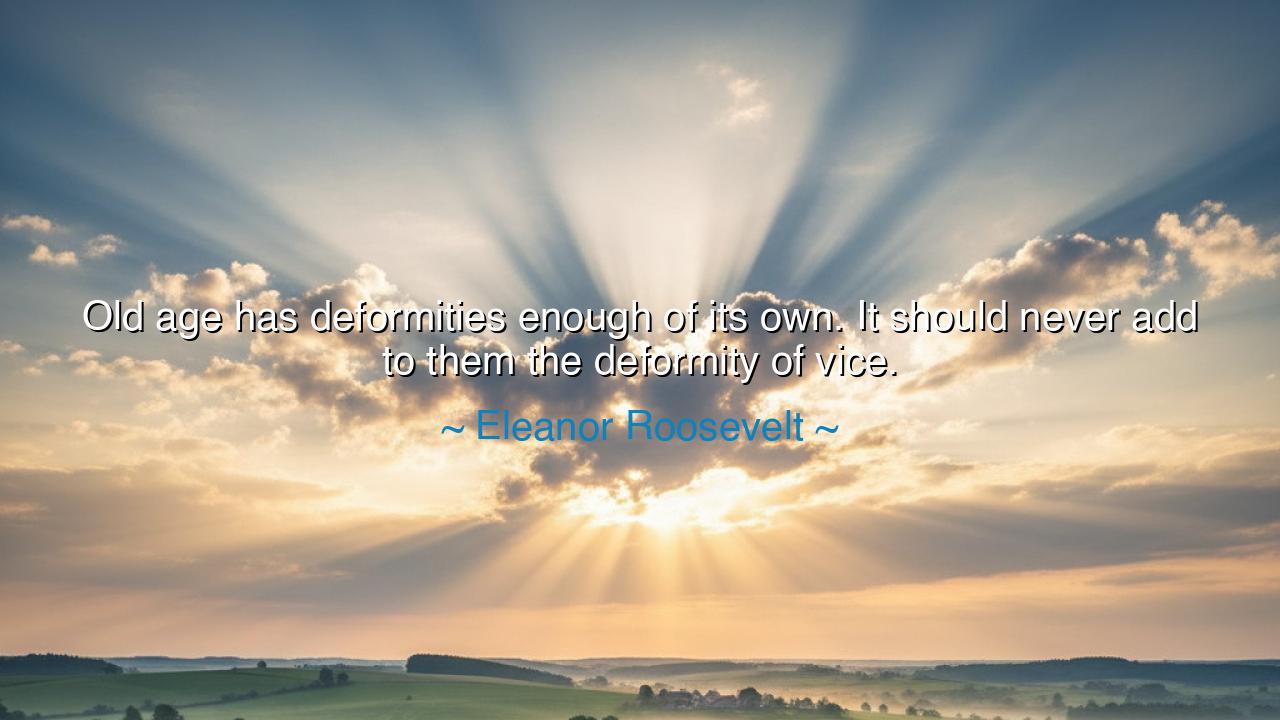
Old age has deformities enough of its own. It should never add to
Old age has deformities enough of its own. It should never add to them the deformity of vice.






"Old age has deformities enough of its own. It should never add to them the deformity of vice." - Eleanor Roosevelt. These words echo with profound wisdom, offering a powerful reminder that the challenges of old age are already great enough without the added weight of moral decay. As we grow older, the body inevitably weakens, the mind often fades, and the world around us changes in ways that can leave us feeling isolated and vulnerable. Roosevelt speaks to the truth that old age is often a time of struggle—not just against the ravages of the body, but against the pull of bad habits, selfishness, and vice. These, she argues, should never compound the physical deformities that time brings.
Consider the life of Socrates, a man who, despite his advancing years, maintained an integrity that transcended physical decline. His body grew frail, and his vision dimmed, yet his moral character and pursuit of wisdom remained steadfast until the end. Socrates was a living example of Roosevelt’s wisdom: the challenges of aging, for him, were already enough. Yet, he refused to allow any vice, such as greed, envy, or laziness, to take root in his life. His commitment to virtue was unwavering, showing that old age, though marked by fragility, should be a time for reflection, moral clarity, and inner strength, not the decline of moral character.
Roosevelt’s insight speaks to a deep truth: old age may diminish the body, but it should not diminish the soul. Many believe that as we age, we are entitled to indulge in selfishness, to abandon the moral ideals that once guided us. Yet, Roosevelt warns us that to allow vice to take hold at this stage of life is not only to betray our integrity but to compound the suffering that comes naturally with aging. Vice, be it resentment, envy, or self-pity, adds a layer of deformity that makes the physical decay even harder to bear. It corrupts the soul, turning the final years of life into a time of bitterness and regret, rather than one of grace and peace.
Take the story of Winston Churchill, whose later years were marked not only by physical challenges but by a continual commitment to service and dignity. As his body weakened, Churchill’s mind remained sharp, and he continued to contribute to the world with a passion for political reform and a sense of duty to the nation he had served so valiantly in his youth. He did not succumb to vice or indulgence in old age but remained resolute in his character. In this way, Churchill embodied the very essence of Roosevelt’s message: to grow old is not an excuse for moral laxity but a call to maintain integrity until the very end.
Roosevelt’s message is not one of mere physical endurance, but of moral endurance. The body may fail us, but our character—our ability to live with integrity, honor, and purpose—is what we should protect with all our strength. Old age is not an excuse to abandon the ideals that we once held dear, but an opportunity to reflect on our moral journey and to ensure that we pass into the final years with dignity, wisdom, and virtue intact. To allow vice to corrupt us in our later years is to squander the most precious of life’s opportunities: to live as a model of what it means to grow wise, to age gracefully, and to leave behind a legacy that inspires others.
Thus, the lesson for us all is clear: do not let vice take root as you grow older. The deformities of old age—the frailty, the weariness, the loss of independence—are unavoidable, but we can choose to preserve our integrity amidst them. Reflect on your life’s journey and take steps to ensure that you continue to live with honor, grace, and moral clarity. Let old age be a time not of decay, but of ripening, of becoming the best version of yourself, free from the shackles of bitterness, resentment, or self-indulgence. As Roosevelt teaches, the final years are the time to embrace virtue rather than to give way to vice, for it is character that endures, not the physical body.
The practical actions we must take are simple: cultivate grace and compassion for yourself and others as you grow older. Resist the temptation to retreat into selfishness or bitterness, and instead focus on leaving behind a legacy of virtue and integrity. Live the final years of your life as a testament to the principles you have always valued, and let your example inspire others to live with the same courage, dignity, and honor.






AAdministratorAdministrator
Welcome, honored guests. Please leave a comment, we will respond soon